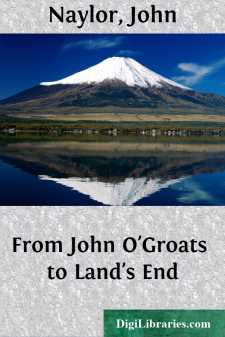Categories
- Antiques & Collectibles 13
- Architecture 36
- Art 48
- Bibles 22
- Biography & Autobiography 813
- Body, Mind & Spirit 142
- Business & Economics 28
- Children's Books 15
- Children's Fiction 12
- Computers 4
- Cooking 94
- Crafts & Hobbies 4
- Drama 346
- Education 46
- Family & Relationships 57
- Fiction 11829
- Games 19
- Gardening 17
- Health & Fitness 34
- History 1377
- House & Home 1
- Humor 147
- Juvenile Fiction 1873
- Juvenile Nonfiction 202
- Language Arts & Disciplines 88
- Law 16
- Literary Collections 686
- Literary Criticism 179
- Mathematics 13
- Medical 41
- Music 40
- Nature 179
- Non-Classifiable 1768
- Performing Arts 7
- Periodicals 1453
- Philosophy 64
- Photography 2
- Poetry 896
- Political Science 203
- Psychology 42
- Reference 154
- Religion 513
- Science 126
- Self-Help 84
- Social Science 81
- Sports & Recreation 34
- Study Aids 3
- Technology & Engineering 59
- Transportation 23
- Travel 463
- True Crime 29
From John O'Groats to Land's End
by: John Naylor
Description:
Excerpt
HOW WE GOT TO JOHN O' GROAT'S
Thursday, September 7th.
It was one o'clock in the morning when we started on the three-mile walk to Warrington, where we were to join the 2.18 a.m. train for Glasgow, and it was nearly ten o'clock when we reached that town, the train being one hour and twenty minutes late. This delay caused us to be too late for the steamboat by which we intended to continue our journey further north, and we were greatly disappointed in having thus early in our journey to abandon the pleasant and interesting sail down the River Clyde and on through the Caledonian Canal. We were, therefore, compelled to alter our route, so we adjourned to the Victoria Temperance Hotel for breakfast, where we were advised to travel to Aberdeen by train, and thence by steamboat to Wick, the nearest available point to John o' Groat's.
We had just time to inspect Sir Walter Scott's monument that adorned the Square at Glasgow, and then we left by the 12.35 train for Aberdeen. It was a long journey, and it was half-past eight o'clock at night before we reached our destination, but the weariness of travelling had been whiled away by pleasant company and delightful scenery.
We had travelled continuously for about 360 miles, and we were both sleepy and tired as we entered Forsyth's Hotel to stay the night.
Friday, September 8th.
After a good night's rest, followed by a good breakfast, we went out to inquire the time our boat would leave, and, finding it was not due away until evening, we returned to the hotel and refreshed ourselves with a bath, and then went for a walk to see the town of Aberdeen, which is mostly built of the famous Aberdeen granite. The citizens were quite proud of their Union Street, the main thoroughfare, as well they might be, for though at first sight we thought it had rather a sombre appearance, yet when the sky cleared and the sun shone out on the golden letters that adorned the buildings we altered our opinion, for then we saw the "Granite City" at its best.
We spent the time rambling along the beach, and, as pleasure seekers generally do, passed the day comfortably, looking at anything and everything that came in our way. By no means sea-faring men, having mainly been accustomed to village life, we had some misgivings when we boarded the s.s. St. Magnus at eight o'clock in the evening, and our sensations during the night were such as are common to what the sailors call "land-lubbers." We were fortunate, however, in forming the acquaintance of a lively young Scot, who was also bound for Wick, and who cheered us during the night by giving us copious selections from Scotland's favourite bard, of whom he was greatly enamoured. We heard more of "Rabbie Burns" that night than we had ever heard before, for our friend seemed able to recite his poetry by the yard and to sing some of it also, and he kept us awake by occasionally asking us to join in the choruses. Some of the sentiments of Burns expressed ideals that seem a long time in being realised, and one of his favourite quotations, repeated several times by our friend, dwells in our memory after many years:
For a' that an' a' thatIt's coming, yet, for a' that,That man to man the war-ld o'erShall brithers be for a' that....

